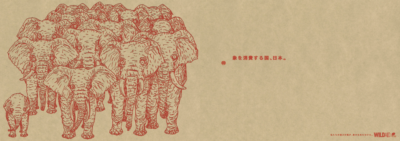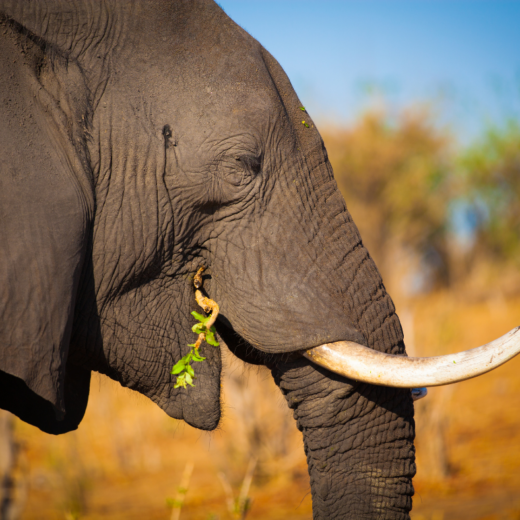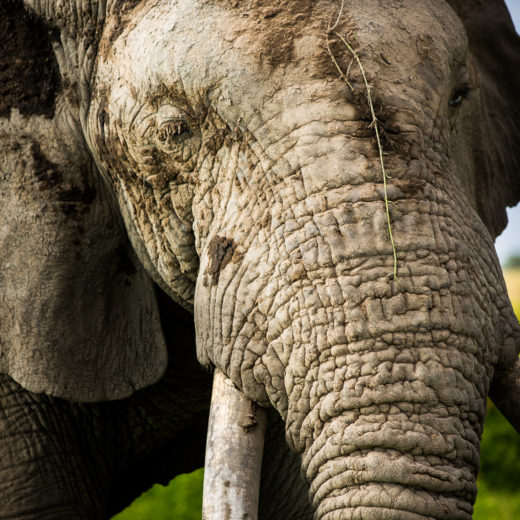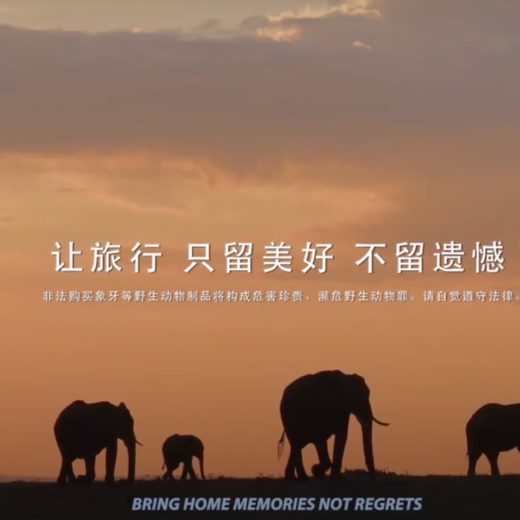
A new campaign from WildAid and Tears of the African Elephant, a Japanese NGO, calls on Japan to end its ivory trade starting with abandoning ivory hanko stamps. Roughly 80% of Japan’s ivory consumption is for hankos, which are used to sign official documents, like marriage licenses and business contracts. Replacing ivory with other materials, such as wood or stone, would reduce demand for ivory from wild elephants.
“As the last major legal market, we hope that Japan can join the global community in ending legal sales of ivory as soon as possible,” said Peter Knights, CEO of WildAid. “It would be a historic moment for elephant conservation, winning Japan great acclaim globally.”
The campaign’s animated video, called Hankograph and created by Grey Tokyo and Academy Award-nominated artist Koji Yamamura, tells the story of how hankos are made, connecting elephant poaching to the final product. Some 500 wooden hankos were used to create the video, a self-reflexive approach for a stylized 2,400 frames of stop-motion animation.
The campaign – shared on social media, billboards, and traditional media – also calls upon the Japanese public to sign a petition supporting Japan’s closure of the domestic ivory trade.
The Japanese public has been sharing the campaign video ahead of May 1, when Emperor Akihito will abdicate and pass the office to his son, Crown Prince Naruhito. Viewed with great symbolic meaning and an opportunity to start fresh, government offices expect couples will rush to register their marriages – using hankos.
“Unlike usage in traditional music, ivory hankos can be replaced by several other materials,” said Airi Yamawaki, Director of WildAid Japan and founder of Tears of the African Elephant. “Since most of the ivory in Japan is used for hankos, using other materials would be a big step forward to reduce demand.”
There are signs certain industries are willing to give up hankos altogether, particularly as businesses court younger customers and digitize their services. Last month, some of the country’s biggest banks announced hankos will no longer be required to open accounts or withdraw money.
Japan has imported ivory from more than 250,000 African elephants since 1970, including a significant portion from poached wild elephants. In 1999, Japan was permitted to buy nearly 50 tonnes of ivory from Zimbabwe, Botswana, and Namibia at a CITES-approved ivory auction. In 2008, Japan was allowed to import a further 48 tonnes of ivory.
The government has come under more pressure to shut down its ivory market since China (including Taiwan and Hong Kong SAR) banned ivory in 2017. Singapore, Vietnam and Thailand have each passed similar legislation. The end of the global ivory trade is now in sight for the first time in history with Japan as the only major holdout.
Beginning in July 2019, Japan will require ivory traders to prove, via carbon dating, that whole tusks were legally acquired. The country’s ivory registration process has only identified a fraction of ivory known to be in the country.
At a press conference, Japan’s Environment Ministry said: “By shutting down the movement of ivory of unknown origin, the domestic market is moving closer to an effective closure.”
A final closure of all major legal markets would be truly historic and instantly bolster Japan’s environmental image worldwide, especially if the end date were to be announced in advance of the 2020 Olympics when all eyes will be on Japan.
WildAid is working in Japan to support any government effort to end the trade and address the remaining demand for ivory, particularly hankos. These Japanese stamps were not traditionally made from ivory, but the economic boom in the 1970s and 1980s prompted carvers to switch materials, and many people purchased whole ivory tusks believing it to be an investment.
In 2012, WildAid launched a massive campaign to reduce ivory demand in China, the world’s largest market, in partnership with Save the Elephants and African Wildlife Foundation. As a result, public awareness of the poaching crisis increased 50% in the first two years, and in 2014, 95% of those polled supported banning the ivory trade.
Since then, wholesale ivory prices in Hong Kong SAR and Mainland China dropped as much as 78% between 2014 and 2016, and ivory seized coming into China fell by 80% in 2016. Data from Hong Kong SAR also shows a stark decline in ivory seizures: 370 kg of ivory in 2018, down from 7,600 kg in 2017.


Stay in touch and get the latest WildAid updates.
SIGN UPAbout WildAid
WildAid is a non-profit organization with a mission to protect wildlife from illegal trade and other imminent threats. While most wildlife conservation groups focus on protecting animals from poaching, WildAid primarily works to reduce global consumption of wildlife products such as elephant ivory, rhino horn and shark fin soup. With an unrivaled portfolio of celebrity ambassadors and a global network of media partners, WildAid leverages more than $308 million in annual pro-bono media support with a simple message: When the Buying Stops, the Killing Can Too.
Journalists on deadline may email communications@wildaid.org


